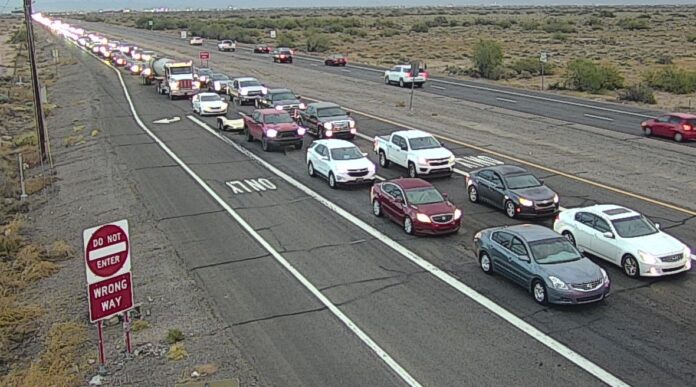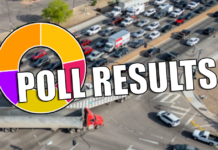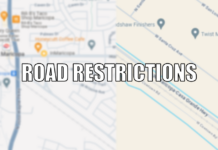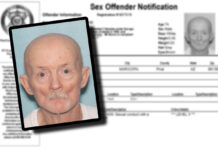
The Arizona Supreme Court’s ruling last Tuesday invalidating Pinal County’s half-cent sales tax to fund roads has left the county wondering what is next and has crucial transportation projects in limbo.
And while there are many different interpretations of the high court’s ruling on Propositions 416 and 417, one thing is certain – the estimated $80 million in tax revenue held in escrow by the Arizona Department of Transportation isn’t going to be upgrading or widening State Route 347 or building the Sonoran Desert Parkway any time soon.
Maricopa City Councilmember Henry Wade summed it up from the city’s perspective.
“This is bad news for Pinal County and bad news for Maricopa,” Wade said. “Where’s the money going? What happens to all that money people put out there in good faith that it would be used to fix roads and build new roads that we need? I’m very disappointed. It’s really going to set us back in terms of transportation in the area.”
Mayor Christian Price said the setback could last for a while.
“I am very frustrated with the court,” Price said. “They could have struck the law down partially – they could have said they would strike down the two-tiered tax part of it but keep the tax itself in place and change the way it was applied. That would have allowed us to get it back in place relatively quickly.”
He cited a study by the Arizona Department of Transportation that said that road construction costs that were $100 in 2016 are now at $172. That means that any delays just make all highway projects more expensive. He also expressed frustration with the Goldwater Institute for filing the lawsuit.
“Nobody who went into that ballot booth that didn’t know they were imposing a tax on themselves with the money going to roadways,” Price said. “It didn’t matter if it was a two-tiered, three tiered or 10-tiered tax. And now we’re in a spot where there is not really a viable option to continue it. Right now, with the current climate, I don’t think a transportation tax would pass right now, and I’m the eternal optimist.”
Losing the tax revenues is a major issue for transportation in Pinal County. The funds from Propositions 416 and 417 were to be allocated to the county’s highest-priority construction and upgrade projects: widening and improving SR 347; construction of the Sonoran Desert Parkway linking southern Maricopa and Interstate 10; and the north-south parkway, which would connect SR 24 and US 60, then move south through the eastern part of the county between Florence and Coolidge and join I-10 south of Eloy.
Maricopa City Attorney Denis Fitzgibbons said the court ruled that the tax itself was legal, but the two-tiered implementation, in which only the first $10,000 of a transaction are subject to tax, is illegal in the county.
“It seems to me that they’re saying everything the county did to enact the tax is correct,” Fitzgibbons said. “But the way the tax was set up was unlawful. We rarely see 4-3 decisions out of the Arizona Supreme Court, but when you read the dissent, it’s easy to see where they are saying state law doesn’t allow Pinal County to adopt a two-tiered PTP structure. They are invalidating the tax, saying the county followed procedures, voters approved it, but that state statutory law doesn’t allow for a two-tier system.”
Fitzgibbons said cities frequently utilize this taxing method, but cities and counties operate under different tax laws and the mechanism is illegal for counties.
Attorney Jordan Rose of the Rose Law Group, a high-profile lobbying firm in the state, was more optimistic that the tax can be resurrected quickly.
“The Court provided a roadmap for how the tax can be structured slightly differently so that it is legal,” Rose said. “We can go back, make this technical correction, with no new taxation and ensure Pinal County builds these essential roads. If we take the technical correction to fix the legal issues to the ballot in November, we won’t miss much time at all.
Government officials, attorneys and legislators are divided on whether the measure could be back on the ballot this November. There are the political implications of officials proposing a tax hike in an election year, and also the matter of what will happen to the money collected since 2019. That’s the biggest concern of Vice Mayor Vincent Manfredi.
“Any talk of getting this back on the ballot is premature until it is determined what will happen with the more than $82 million that has been collected and is sitting in an escrow account,” Manfredi said.
Price said current events also will play into the upcoming decision.
“There are political realities,” Price said. “We have all-time high gas prices and runaway inflation, so we have now is a new political paradigm from a year ago. There’s a war between Russia and Ukraine, runaway inflation, gas around $5 a gallon – how can we turn around and ask for this tax even though people have already been paying it?
‘We’ll see what the powers that be come up with. Most likely it will not be on the ballot this November, but at some point, it’s got to go to the ballot. If we want new and better roadways, we’ve got to get them funded. We can pay for them now, but if we don’t it will just get more expensive and it’s just going to get harder.”
EDTIOR’S NOTE: Vincent Manfredi is part owner of InMaricopa









![City gave new manager big low-interest home loan City Manager Ben Bitter speaks during a Chamber of Commerce event at Global Water Resources on April 11, 2024. Bitter discussed the current state of economic development in Maricopa, as well as hinting at lowering property tax rates again. [Monica D. Spencer]](https://www.inmaricopa.com/wp-content/uploads/2024/04/spencer-041124-ben-bitter-chamber-property-taxes-web-218x150.jpg)



![Maricopa’s ‘TikTok Rizz Party,’ explained One of several flyers for a "TikTok rizz party" is taped to a door in the Maricopa Business Center along Honeycutt Road on April 23, 2024. [Monica D. Spencer]](https://www.inmaricopa.com/wp-content/uploads/2024/04/spencer-042324-tiktok-rizz-party-flyer-web-218x150.jpg)




Dear Mayor Price and city council. Take a day. A full day. To be discouraged, angry, and downright mad. Then shake it off, and get back to work. Maricopa needs this road (347) fixed and you all can do it. This is just a “bump in the road”, no pun intended, (maybe). So thank you for all that you city council folks do, and stay the course.